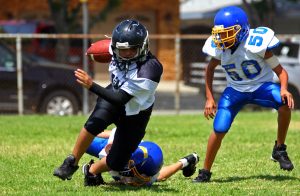New research from Université Laval is setting the stage for quicker return-to-play decisions that satisfy all the necessary player safety protocols by tapping into the expertise of licenced health care providers involved as team therapists. The four-year research project was led by Dr. Pierre Frémont, a practising sport physician and one of Canada’s leading authorities on concussions.
The Four Rs of concussion management provide guidance to help support an athlete’s safe return to competition: RECOGNIZE the signs and symptoms of a concussion; REMOVE the athlete from the game or practice; REFER the athlete to a licenced health care professional; and RETURN to school then sport based on the recommendations of a medical expert. The Canadian Guideline on Concussion in Sport recommends athletes returning to sport after a concussion are required to be assessed by a medical doctor, nurse practitioner or nurse. Dr. Frémont’s research explores the possibility of including physiotherapists involved with a sport team as one of the experts that can contribute to the return to play decision in simple cases (e.g. those without previous episodes, comorbidities or persisting symptoms).

“The reality is that there simply aren’t nearly enough qualified physicians to provide timely assessments for athletes hoping to return-to-play after a sports concussion,” Dr. Frémont says from his office in Quebec City. “We took an unconventional approach with a high school football team, an approach that is going to open up a lot more access to assessments from qualified health care professionals. For athletes and parents who are frustrated with long waiting lists to see a doctor or nurse practitioner, this is a potential game changer.”
The study involved four teams of high school football players. Over the first two years of the project, Dr. Frémont diagnosed a total of 55 concussions. He conducted all of the medical assessments, prescribed the courses of treatment, and made all of the return-to-play decisions based on widely accepted international guidelines. In none of the cases did an athlete experience a recurrence of concussion symptoms during the same season.
The unconventional adaptation came in year three of the study, when Dr. Frémont partnered with physiotherapist Édith Castonguay, who had more of a day-to-day role with the football team. For the next two years, it was she who made the return-to-play decisions in the vast majority of the 64 concussion cases occurring in years three and four.
“What’s really important to note here is that she made the determinations in cases that met specific conditions,” adds Dr. Frémont. “It had to be the athlete’s first concussion of the season and where he had recovered quickly. There had to be a full return to class and the player had no concussion symptoms during vigorous physical activity. Édith followed all of the recognized international standards and was able to make a majority of the return-to-play decisions, favourable or not. I didn’t need to be involved.”
Any cases that fell outside those strict parameters were referred to Dr. Frémont. Only one case of recurrence of symptoms occurred after the return-to-play authorization was granted by Ms. Castonguay.
Beyond the concussion assessment, Ms. Castonguay relied on her academic training and professional experience to ensure the player’s overall physical assessment was normal. Players were also measured against baseline results from a computerized neuropsychological test conducted at the beginning of the season.
The research results demonstrate safe concussion management, whether it was the team physician or the team therapist who was responsible for applying the return-to-play protocol.
“That finding is significant because physicians and nurse practitioners simply can’t be at every rink, gym, pool or field,” says Dr. Frémont. “Through this kind of team approach, qualified medical expertise is much more readily available for more complex cases.”
Clinical research questions related to this approach are being embedded within a major pan-Canadian research project funded by the National Football League. The Surveillance in High Schools to Reduce Concussions and Consequences of Concussions in Youth, or SHRed Concussions, involves dozens of researchers from nine Canadian universities and more than 30 community, government and industry partners. The project will study athletes in a variety of sports, including hockey, rugby, football, lacrosse, wrestling, soccer, basketball, volleyball and cheerleading, with the goal of reducing concussions and their consequences in youth sport across the country. Dr. Frémont will act as national coordinator for the clinical aspects of the project.
“Our study produced some very promising results, but it needs to be researched further and applied in other sports in other parts of the country,” Dr. Frémont says. “We’re talking about young athletes and brain injuries. We have to do this right.”
Research on this type of multidisciplinary collaboration is of great interest to leading sport medicine authorities including the Canadian Academy of Sport and Exercise Medicine (CASEM) and the Canadian Concussion Collaborative (CCC).
“As Pierre noted, further research could support the future expansion of the network of qualified healthcare professionals who can serve this critical function safely, reliably and in a more timely fashion,” points out CASEM’s Executive Director, Dawn Haworth. “This type of partnership could provide benefits for both patients and healthcare professionals.”
For more information
An abstract of Dr. Frémont’s findings has been published in the British Journal of Sports Medicine, with the full research study soon to be published in a leading Canadian journal.
Canadian Guideline on Concussion in Sport
Joint statement from the Collège des médecins du Québec and the Ordre professionnel de la physiothérapie du Québec on physiotherapist input into return-to-play decisions.
This blog is part of SIRC’s #HeadstrongCanada concussion awareness, prevention and management campaign. The campaign features tools, resources, and best practices in managing and preventing concussions in sport in Canada. Developed in partnership with Sport Canada, Public Health Agency of Canada and other organizations, the toolkit offers credible information and templates recognized by stakeholders throughout the sport system.
Check out the concussion website for concussion information and tools to help your sport be concussion smart. For concussion information directly to your inbox, sign up for SIRC’s concussion newsletter.